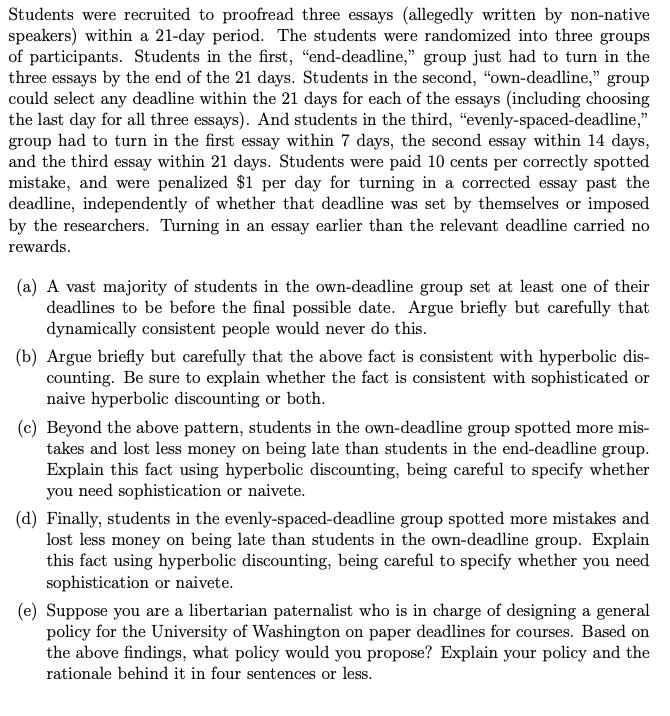Answered step by step
Verified Expert Solution
Question
1 Approved Answer
Students were recruited to proofread three essays (allegedly written by non-native speakers) within a 21-day period. The students were randomized into three groups of

Students were recruited to proofread three essays (allegedly written by non-native speakers) within a 21-day period. The students were randomized into three groups of participants. Students in the first, "end-deadline," group just had to turn in the three essays by the end of the 21 days. Students in the second, "own-deadline," group could select any deadline within the 21 days for each of the essays (including choosing the last day for all three essays). And students in the third, "evenly-spaced-deadline," group had to turn in the first essay within 7 days, the second essay within 14 days, and the third essay within 21 days. Students were paid 10 cents per correctly spotted mistake, and were penalized $1 per day for turning in a corrected essay past the deadline, independently of whether that deadline was set by themselves or imposed by the researchers. Turning in an essay earlier than the relevant deadline carried no rewards. (a) A vast majority of students in the own-deadline group set at least one of their deadlines to be before the final possible date. Argue briefly but carefully that dynamically consistent people would never do this. (b) Argue briefly but carefully that the above fact is consistent with hyperbolic dis- counting. Be sure to explain whether the fact is consistent with sophisticated or naive hyperbolic discounting or both. (c) Beyond the above pattern, students in the own-deadline group spotted more mis- takes and lost less money on being late than students in the end-deadline group. Explain this fact using hyperbolic discounting, being careful to specify whether you need sophistication or naivete. (d) Finally, students in the evenly-spaced-deadline group spotted more mistakes and lost less money on being late than students in the own-deadline group. Explain this fact using hyperbolic discounting, being careful to specify whether you need sophistication or naivete. (e) Suppose you are a libertarian paternalist who is in charge of designing a general policy for the University of Washington on paper deadlines for courses. Based on the above findings, what policy would you propose? Explain your policy and the rationale behind it in four sentences or less.
Step by Step Solution
★★★★★
3.34 Rating (157 Votes )
There are 3 Steps involved in it
Step: 1
a Dynamically consistent people would not set an earlier deadline if they anticipate that they would procrastinate and miss the deadline Setting an ea...
Get Instant Access to Expert-Tailored Solutions
See step-by-step solutions with expert insights and AI powered tools for academic success
Step: 2

Step: 3

Ace Your Homework with AI
Get the answers you need in no time with our AI-driven, step-by-step assistance
Get Started


